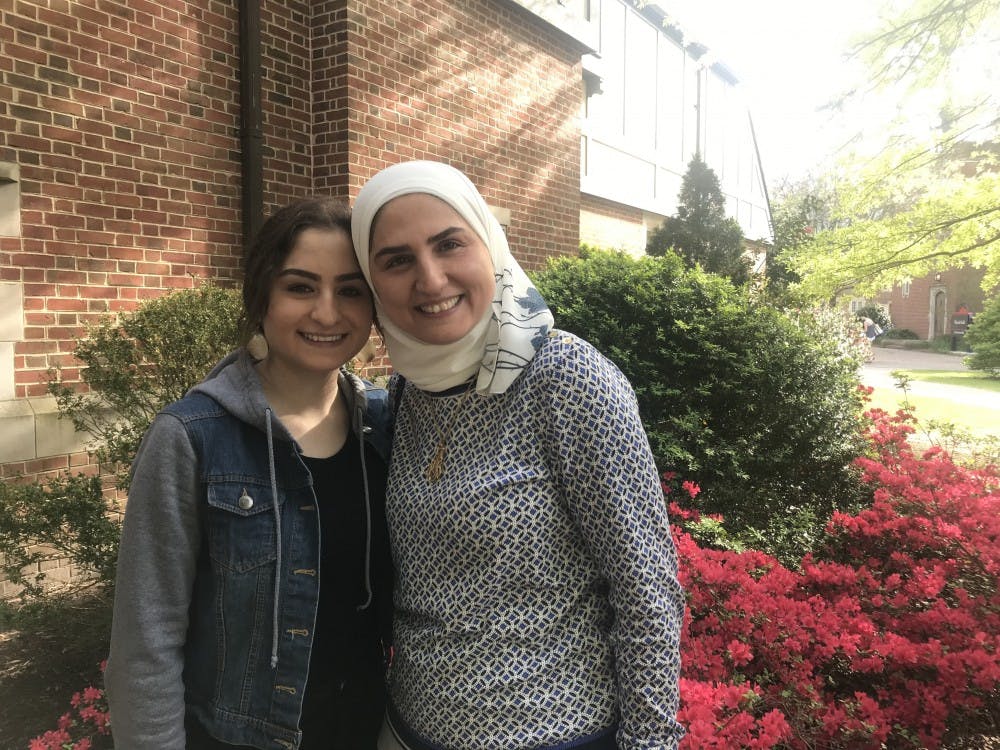Editor's Note: Sana Mouayd Azem is a member of The Collegian's staff.
The Arab Club hosted its first “Stories of Hope and Resilience” discussion with local Syrian refugees Thursday night in the Whitehurst living room.
The two speakers, first-year Sana Mouayd Azem, who is planning on majoring in journalism and film studies, and Maysaa Alsous, her mother, spoke about their experiences moving to the U.S. from Damascus, Syria.
“I had lived my entire life in Syria,” Alsous said in her introduction. “It was the only home I knew.”
From growing up to getting married and raising her own family, she had never imagined leaving everything behind, Alsous said. The decision to move away from friends, family and her birthplace was not easy, she said.
Alsous, her husband and their two daughters fled to the U.S. in 2012 and have been in a pending status for asylum for seven years, she said. Beside the cultural differences they have experienced upon entering the U.S., the added stress of pending status is exhausting and emotionally draining for her and her husband, she said.
The recent Muslim travel ban is an added weight on their shoulders and one they pray will not affect them directly, she said.
After hearing Alsous and Mouayd Azem’s stories, students attending the event asked a variety of questions about the women’s current sentiments and reflections.
If circumstances and the war in Syria changed, both would go back without any hesitation, they said, in response to one student’s question.
Two of the things Alsous misses most from Syria are the Jasmine flowers and her family, she said. And if she could bring one thing back, it would be the “spirit of Damascus,” Alsous added.
While the current situation in Syria does not look promising, Alsous is hopeful to return one day, she said.
Martin Sulzer-Reichel, the Arab Club faculty sponsor, said this event was important for students to learn different ways of life and attitudes.
Enjoy what you're reading?
Signup for our newsletter
“We will learn to personalize the statistics of the refugees we see in the media and confront the reality behind them,” he said.
Junior Mike Laposata, former Arab Club president and current event coordinator, said this event had allowed students to tear down the barriers between what is heard about refugees and what the actual experience of a refugee family is.
When reflecting on the way she had raised Mouayd Azem and her sister once in the U.S., Alsous said, “I always told her [Mouayd Azem] to be a universal person, so that she wouldn’t be connected to one place, but would know and be comfortable with all people.”
The Arab Club hopes to continue to host this style of event with refugees, emigrants or international visitors who are willing to share their stories with the campus community, Laposata and Sulzer-Reichel said separately.
The club also hosts an international movie night during the fall semester. Those interested in joining the club or learning more about its initiative can contact Mouayd Azem, the president of Arab club, at sana.mouaydazem@richmond.edu.
Contact international editor Emma Phelps at emma.phelps@richmond.edu.
Support independent student media
You can make a tax-deductible donation by clicking the button below, which takes you to our secure PayPal account. The page is set up to receive contributions in whatever amount you designate. We look forward to using the money we raise to further our mission of providing honest and accurate information to students, faculty, staff, alumni and others in the general public.
Donate Now



